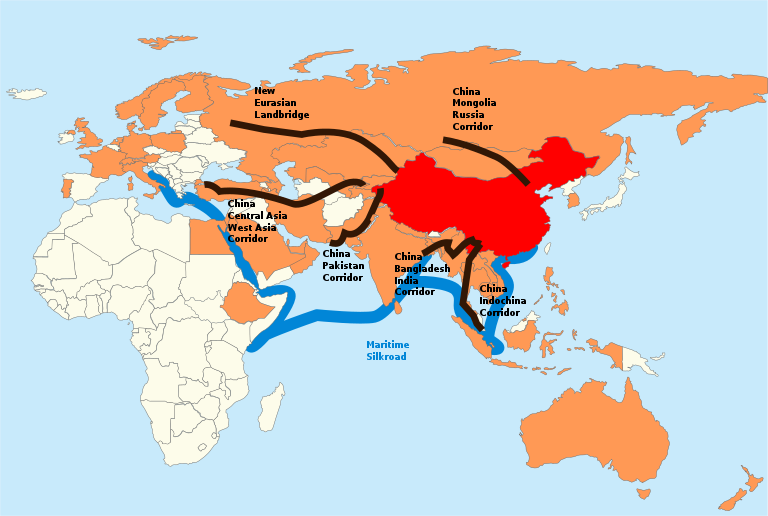It’s been a decade since China launched its massive “Belt and Road” global infrastructure project. This week, representatives from more than 100 countries are gathering in Beijing to discuss the program, which has seen China develop massive infrastructure projects and lend billions of dollars to poorer nations, often with strict repayment conditions attached.
Under the Belt and Road Initiative (BRI), a signature policy of President Xi Jinping, Chinese companies have built ports, roads, railways, power plants and other infrastructure around the world in a bid to boost trade and economic growth.
The initiative is also widely seen as a way for Beijing to assert its geopolitical influence. Among those attending is Russian President Vladimir Putin. In recent months, relations between China and Russia have grown in importance, with Beijing refusing to condemn Putin’s war and the two countries united in their struggle to combat what they perceive as Western dominance.
Putin said that he sees China’s BRI as a desire to cooperate on the global arena, Russian and Chinese news agencies reported on Sunday.
“We see that some perceive it as an attempt by the People’s Republic of China to crush someone under itself, but we don’t see this that way: we just see a desire for cooperation,” Russia’s RIA state news agency cited Putin as saying.
Putin will be attending China’s Belt and Road Forum, set for Tuesday and Wednesday, as Beijing marks the 10th anniversary of its initiative to build infrastructure stretching from Asia to Europe and Africa. The Russian president is expected to push for new energy deals and an expansion of infrastructure projects — two of the six official BRI economic corridors run through Russia — while pitching investment opportunities in the void left by Western companies.
But experts note China has been treading carefully since the Kremlin ordered the invasion of Ukraine in February 2022.
Putin downplayed the idea that China, through its BRI projects in Central Asia, is competing for influence in a region that Russia has long considered its own backyard.
“Our own ideas on the development of the Eurasian Economic Union, for example, on the construction of a Greater Eurasia, fully coincide with the Chinese ideas proposed within the framework of the Belt and Road Initiative,” he told Chinese state broadcaster CCTV, according to a transcript posted on the Kremlin website.
Putin said he and Xi will also discuss growing economic and financial ties between Moscow and Beijing.
The two countries have financial ties in energy, high-tech and financial industries. China has also grown in importance as an export destination for Moscow.
The leaders who arrived on Monday included Ethiopian Prime Minister Abiy Ahmed, Sri Lankan President Ranil Wickremesinghe, Republic of Congo President Denis Sassou Nguesso, Papua New Guinean Prime Minister James Marape and Cambodian Prime Minister Hun Manet.
The BRI, initiated by China in 2013, has significant implications for the countries involved. On the positive side, it promises substantial infrastructure development, including roads, railways, ports, and energy projects, which is intended to improve connectivity within countries and stimulate economic growth. This growth is expected t create jobs, attract foreign investment, and increase trade diversification, offering participating nations the opportunity to tap into new markets and expand their exports.
Some countries, especially in Central Asia and Southeast Asia, will benefit from enhanced energy security through BRI energy projects, reducing their dependence on a single energy source. The initiative also promotes cultural exchange and people-to-people connections, fostering mutual understanding and cooperation among nations.
However, there are notable drawbacks to consider. One of the most significant concerns is the potential for participating countries to accumulate unsustainable levels of debt to China due to high-interest loans and stringent repayment terms. This debt dependency will easily lead to financial instability.
There are also environmental concerns, as large-scale infrastructure projects could potentially have adverse impacts, such as deforestation, habitat destruction, and pollution, potentially harming local ecosystems and livelihoods.
Geopolitically, BRI has raised tensions, with some nations viewing it as a means for China to expand its influence and gain strategic leverage, potentially leading to diplomatic disputes and conflicts. Additionally, some countries fear the lack of transparency in BRI projects, from financing to environmental assessments and project details, may foster corruption and mismanagement.
Economic imbalances within countries are likely to become exacerbated, as some regions may benefit more from infrastructure development than others, leading to disparities in development.
There are concerns about countries potentially losing sovereignty over strategically important assets, such as ports or infrastructure, if they default on loans and China takes control of these assets.
Consequently, while the BRI offers considerable economic and infrastructural benefits, careful management and addressing of the associated risks are crucial for participating nations and this is exactly what the leaders gathered in Beijing are discussing.
It is unlikely that Russia will remain satisfied for long to be perceived as second to China. Putin may be going along for now, but eventually, he will want to demonstrate Russia is overtaking China in this regard.
